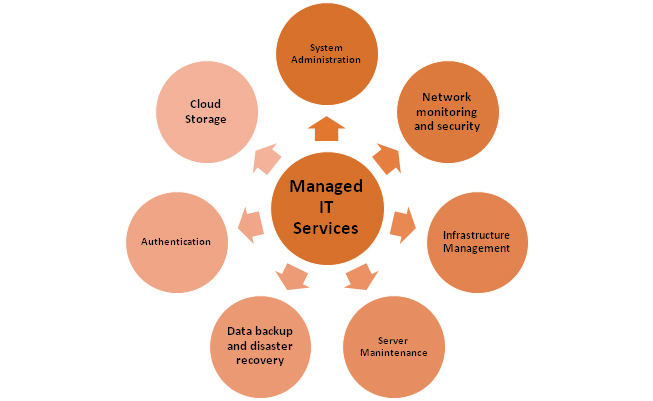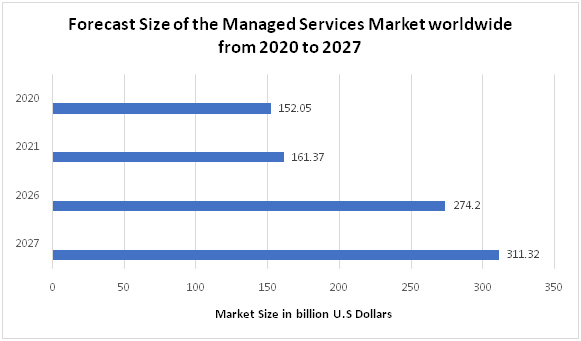IT Managed Services Demystified
The phrase “digital transformation” is a simple way to describe a process that is more often very complex. Everyone will experience a period of IT modernization differently, with different specifics and nuances. Sometimes hiring experts to manage your IT service can be more practical.
Many technological systems, including computers, phones, networks, and passwords, keep small- to medium-sized businesses (SMBs) operating and their data secure. However, many SMBs lack the time, resources, or expertise to manage these systems internally.
Managed IT services can help with that.
If you’ve ever dismissed the idea of outsourcing support to a third-party provider because you believe your IT structure is adequate or due to cost concerns, now is the time to reconsider. Managed Service Providers (MSPs) do exactly what their name implies by relieving organizations of the burden of managing IT functions so they can focus on their routine daily tasks.Let’s see how.
What are IT Managed Services?
Tasks handled by a third party are referred to as managed IT services, frequently in the context of business information technology services. One option is to delegate general functions to an expert using the managed services model to cut costs, enhance service quality, or free up internal teams to work on tasks that are unique to their business. A managed service provider (MSP) is a company that offers these services.
Although managed IT services can cover a wide range of duties, they frequently include:
- Hardware and infrastructure remote monitoring and management.
- Services related to security, such as monitoring, threat hunting, penetration testing, or incident response.
- Support for communications, including services for IP telephony.
- Cloud service management, monitoring, and configuration. These can be provided alongside managed cloud services or separately from them.

According to Statista:
“In recent years, the demand for managed services has increased dramatically. The global managed services market was worth $185.98 billion in 2019 and is expected to grow to $356.24 billion by 2025.”

Benefits of IT Managed Services
Transferring your system knowledge and tooling to a third-party vendor and choosing a managed service provider may seem like a lot of work. Why, then, should you think about outsourcing?
Your internal team might be able to keep everything operational and put out fires as needed. But removing these duties from their to-do lists has significant advantages:
Cost Control
Cost factors for a business service are determined by an organization’s need for service availability and criticality.
The MSP absorbs the typical cost elements of an IT department, such as personnel, equipment, and training, and presents these costs to the business as a fixed monthly fee. This aids in accurately predicting monthly costs when budgeting.
The most significant advantage is that a business can choose how much to scale based on financialconsiderations and the strategic vision of the CIO. Additionally, IT service outagesand interruptions can be avoided, reducing the likelihood of further losses. Regarding the energy company, the client went from having several scheduled outages daily to just one monthly.
High Availability, Efficiency, and Productivity
The old saying “time is money” is always true regarding IT services. For many organizations, maintaining the availability of mission-critical IT services is of utmost importance for optimum business performance.
When using a managed service, clients get better performance with little downtime. Mission-critical applications frequently involve various technologies, all of which must be fully functional and integrated to provide the IT service required. The IT service must have all its component applications available at once for internal end users to benefit from it. An MSP can guarantee maximum uptime and minimal service interruptions.
Companies that try to implement and maintain all IT services internally typically have:
- Much greater costs for research and development (R&D)
- longer deployment times
You’re probably passing this higher cost on to the people who use your services.
On the other hand, the MSP excels at offering IT services to the company in a way that minimizes costs and expedites deployment time while still delivering a high-quality service.
Improved Risk Management
Every business faces some level of risk. This can be reduced by reducing the risk associated with each essential business service. An MSP can minimize risk by providing unique methodologies and cutting-edge hardware and softwareaccess. This makes it possible to follow best practices and reduces the risk associated with service delivery.
For the business it serves, the MSP manages a large portion of the risk by:
- Having expertise in a particular industry, particularly insecurity and compliance issues
- Collaborating with your company and advising you on how to minimize risk in your areas of expertise
Strategic Vision Far Ahead
The last but not least advantage of managed service providers is their capacity to adopt a broader, more predictive vision of client operations and to think strategically about the future. This enables MSPs to chart clients’ business development with the best and most efficient solutions, offer guidance on making decisions and hit significant checkpoints along the path to success.
Latest Trends in IT Managed Services
The managed services sector is directly correlated with the IT sector in terms of advancements.
Why?You ask?
The answer is quite simple. MSPs are chosen because of their proficiency with technology. MSPs improvise—changing their operations, technological foundation, and management procedures—to stay in business and one step ahead of their rivals.
Let’s take a look at some managed services trends.
IoT (Internet of Things)
The Internet of Things has compelled businesses to reconsider how their customers access information today and strategize how best to reach them. Every year, millions of devices connect to the Internet, further complicating an already complex landscape, let alone the integration issues and cyberthreats presented by many channels.
Managed service providers can strengthen security for each layer of the IoT ecosystem here. A Managed Service Provider (MSP) can help organizations leverage IoT for innovation and stay one step ahead of the technology curve by providing skilled resources and round-the-clock support services.
Automation
The Managed Services Providers Industry is moving towardsadopting automation and many others. Eliminating repetitive and redundant tasks and workloads is a top priority for businesses focused on process optimization and efficiency. This results in new preferences for MSPs centered on increasing employee and customer satisfaction.
Cloud
The cloud industry has penetrated every nook and corner of the IT sector. It’s becoming more popular as time goes on because even the smallest companies want to be global, and the cloud makes it possible to offer services from anywhere.
New platforms are already being developed using cloud technology to accelerate the digital transformation of businesses. However, most organizations cannot move their processes to cloud platforms due to a lack of internal infrastructure and skill sets. MSPs can quickly and affordably assist businesses in integrating this technology into their operational procedures.
Businesses’ Pain Points and how Managed Services can Help?
Here are some of the pain points businesses face that do not use managed services and how managed services can assist them.
Sick Days or Vacations
IT is a specialized field of study in and of itself. IT employees take their knowledge with them when they leave the office at the end of the day. This creates a challenging situation for small IT departments in the SMB market. There is frequently no one else available to pick up the slack if anIT team member is sick or away on vacation. The company is left vulnerable, or the IT person is confined to their cell phone while they are away. Neither situation is appealing.
- The Managed Services Solution: An SMB can get a shield of protection covering their systems every second of every day by agreeing to a Managed Services contract. Essential applications will receive any support they require even if the team is ill, on vacation, or otherwise unavailable, allowing business operations to continue as usual.
Turnover in the IT Department
The high demand for qualified IT professionals is one of the challenging realities of the industry. There is a shortage of highly skilled engineers, which is a problem for all businesses. Therefore, IT turnover impacts large and small companies, but it can be especially harmful to SMBs. An SMB might suddenly find itself without any technical support.
- The Managed Services Solution: In case of an illness or vacation, managed services can act as a safety net for the SMB company. The managed service provider is prepared to fill in indefinitely or until a replacement is found if an essential IT administrator leaves.
Graveyard Shift
An organization’s network and data systems do not have the luxury of a night off, and a network failure discovered in the morning can cost a company thousands of dollars in productivity loss. Creating a graveyard shift and keeping one of your staff members in the office for monitoring and maintenance is the only option for many small IT teams. While doing so gives the environment the coverage it requires, it also burdens the team unnecessarily.
- The Managed Services Solution:While the IT team is off-duty, Managed Services can offer the extra set of eyes that the company needs. The essential business applications for the company are monitored and fixed round the clock. Thanks to IT managed Services, the business does not have to give up the peace of mind to achieve work-life balance.
Augmenting the Existing Team
IT is an extensive field of study, and each discipline has enough depth to warrant a lifetime of study. One person with in-depth knowledge of the entire IT landscape is incredibly rare.
- The Managed Services Solution: Think of the department’s skill level as a leaking roof. The team can undoubtedly repel most of the water in a downpour, but there are a few places where the rain can still get through. Managed Services fills these gaps with a sealant. Managed Services can fill in a few spots if that’s all you need. On the other hand, Managed Services can also assist with other areas if they call for extra support.
Conclusion
You are now aware of the benefits of using IT managed services for your business.
It’s critical to outsource IT support for various reasons, including ensuring that your customer’s data is secure and that your business has access to the newest technology.
Listen,invest, and grow!

 Inquire@itcompanydenver.com
Inquire@itcompanydenver.com